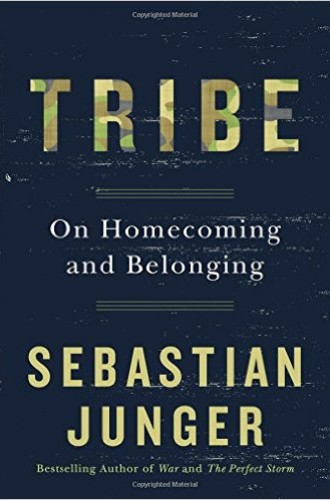What soldiers come home to
Sebastian Junger is a masterful documentarian of modern warfare. His 2010 book War, along with companion films Restrepo (2010) and Korengal (2014), invited those who have not been to war into the inner life of a U.S. army combat platoon at a remote outpost in the Korengal Valley of Afghanistan. Those works vividly display the alternating boredom and exhilaration of war, the anguish of loss, the unit’s pervasive distrust of Afghan civilians, and the intense and complex love of soldiers for one another.
If War is about making war, Tribe is about returning from war. It lacks the keen focus on individual soldiers that made the earlier book so powerful. Junger acknowledges that many veterans are struggling to integrate into civilian life after their military service, that “the U.S. military now has the highest reported PTSD rate in its history,” and that the suicide rate of American veterans now exceeds that of the population. A study released in July 2016 by the U.S. Department of Veterans Affairs documented that in 2014 an average of 20 veterans per day died by suicide, with especially high rates among male veterans aged 18–29.
Read our latest issue or browse back issues.
Junger rejects several common assumptions about these problems: that suicide among younger veterans is associated with deployment (it is not); that combat intensity is the primary driver of posttraumatic stress disorder (factors like premilitary trauma and current social support are also important), and that the best response to struggling veterans is medical treatment and lifelong disability income. He points out that these responses ignore the ways that war can constructively bind service members and civilians within powerful and healing systems of “shared public meaning.”
For Junger, the primary problem is not with veterans, nor even with war itself, but with a “modern society that is so mortally dispiriting to come home to.” Modern American culture is too individualistic, too self-centered, too materialistic, and too divided. Veterans return from the close-knit experience of war and find themselves adrift in a civilian culture that is unwilling to hear veterans’ stories, lacking in basic employment opportunities, and missing any sense of broad communal purpose. Unsupported and unable to accommodate themselves to this culture, many veterans remain disaffected and disengaged. They find themselves drawn into the economically but not existentially sustaining systems of disability and medical care.
The solution, Junger argues, is to return to what he regards as our human evolutionary roots in “tribe.” Tribe, loosely defined as “the group of people you would both feed and help defend,” is “the kind of close-knit group that humans evolved for.” Anecdotally surveying a number of nonindustrialized cultures (and also, notably, the modern state of Israel), Junger calls modern Americans to reclaim a tribal identity characterized by common purpose, common meaning, and common defense.
There are very important moments of wisdom and insight in this book. Junger rightfully names many sins of modern American life, especially its growing socioeconomic disparity. His description of contempt in modern politics as “particularly toxic because it assumes a moral superiority in the speaker” is something that Facebook- and Twitter-driven culture and church need to hear. His assertion that “humans don’t mind hardship, in fact they thrive on it; what they mind is not feeling necessary” is a good reminder for the church.
But Junger’s particular vision of tribe is not the vision that we need. Packing too much into a small book, Junger loosely and selectively engages empirical scholarship on trauma and PTSD. His claim that American soldiers appear to suffer PTSD at twice the rate of British counterparts, for example, is presented with no context regarding how these groups’ background and experiences might differ. His use of other cultures (I count ten) to highlight the deficiencies of modern Western culture, paired with his confident evolutionary assertions, conjures the trope of the “noble savage,” romanticizes these cultures, and reinforces his position as a privileged observer. And he invokes evolution to reify a distinctly masculine vision of crisis leadership.
The fundamental theological problem with the book, however, is that despite his rhetorical homage to belonging and homecoming, Junger’s idyllic tribe derives its meaning, moral energy, and continued existence from war. “Preservation of the tribe” is “an almost sacred task”; war “inspires ancient human virtues of courage, loyalty, and selflessness”; a society that doesn’t offer its members opportunity for the systematic sharing of food and altruistic group defense “isn’t a society in any tribal sense of the word; it’s just a political entity that, lacking enemies, will probably fall apart on its own.” But this is a dangerous claim in our current political season: it’s only a short jump from there to the ethno-nationalism of “we used to win; we don’t win anymore.”
Christians should reject Junger’s vision of an idealized “tribe” that derives its moral and spiritual energy from war. But Junger is right about the capacity of war to inscribe meaning and generate bonds of love, about humans’ essential need for belonging, and about the profound disillusionment that many veterans feel upon returning home. Tribe is therefore a challenge for the church. How might Christians display a life together that is at least as compelling as the life made possible by war? Junger helps us to see that what returning veterans need most is not pity, nor valorization, nor even honor, but rather mission: mission in the service of a different commander, a conquering Lion who is the Lamb at the center of the throne, whose word is grace and peace. The church must invite veterans into a mission animated not by war and death but by the death-conquering life of Jesus. The church must give veterans—and, for that matter, all of us—something to do.
“What you would risk dying for—and for whom—is perhaps the most profound question a person can ask.” Christians would do well to ask, and answer, Junger’s question for themselves.






